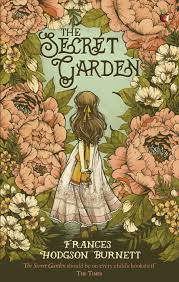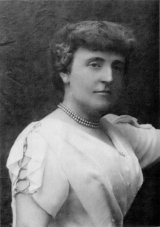The Secret Garden
The Secret Garden is a novel by Frances Hodgson Burnett first published in book form in 1911, after serialization in The American Magazine. Set in England, it is one of Burnett's most popular novels and seen as a classic of English children's literature. Several stage and film adaptations have been made.
- Year:
- 1911
- 77,956 Views
Submitted by acronimous on August 27, 2020
Modified by davidb on February 20, 2025
CHAPTER I THERE IS NO ONE LEFT When Mary Lennox was sent to Misselthwaite Manor to live with her uncle everybody said she was the most disagreeable-looking child ever seen. It was true, too. She had a little thin face and a little thin body, thin light hair and a sour expression. Her hair was yellow, and her face was yellow because she had been born in India and had always been ill in one way or another. Her father had held a position under the English Government and had always been busy and ill himself, and her mother had been a great beauty who cared only to go to parties and amuse herself with gay people. She had not wanted a little girl at all, and when Mary was born she handed her over to the care of an Ayah, who was made to understand that if she wished to please the Mem Sahib she must keep the child out of sight as much as possible. So when she was a sickly, fretful, ugly little baby she was kept out of the way, and when she became a sickly, fretful, toddling thing she was kept out of the way also. She never remembered seeing familiarly anything but the dark faces of her Ayah and the other native servants, and as they always obeyed her and gave her her own way in everything, because the Mem Sahib would be angry if she was disturbed by her crying, by the time she was six years old she was as tyrannical and selfish a little pig as ever lived. The young English governess who came to teach her to read and write disliked her so much that she gave up her place in three months, and when other governesses came to try to fill it they always went away in a shorter time than the first one. So if Mary had not chosen to really want to know how to read books she would never have learned her letters at all. One frightfully hot morning, when she was about nine years old, she awakened feeling very cross, and she became crosser still when she saw that the servant who stood by her bedside was not her Ayah. “Why did you come?” she said to the strange woman. “I will not let you stay. Send my Ayah to me.” The woman looked frightened, but she only stammered that the Ayah could not come and when Mary threw herself into a passion and beat and kicked her, she looked only more frightened and repeated that it was not possible for the Ayah to come to Missie Sahib. There was something mysterious in the air that morning. Nothing was done in its regular order and several of the native servants seemed missing, while those whom Mary saw slunk or hurried about with ashy and scared faces. But no one would tell her anything and her Ayah did not come. She was actually left alone as the morning went on, and at last she wandered out into the garden and began to play by herself under a tree near the veranda. She pretended that she was making a flower-bed, and she stuck big scarlet hibiscus blossoms into little heaps of earth, all the time growing more and more angry and muttering to herself the things she would say and the names she would call Saidie when she returned. “Pig! Pig! Daughter of Pigs!” she said, because to call a native a pig is the worst insult of all. She was grinding her teeth and saying this over and over again when she heard her mother come out on the veranda with someone. She was with a fair young man and they stood talking together in low strange voices. Mary knew the fair young man who looked like a boy. She had heard that he was a very young officer who had just come from England. The child stared at him, but she stared most at her mother. She always did this when she had a chance to see her, because the Mem Sahib—Mary used to call her that oftener than anything else—was such a tall, slim, pretty person and wore such lovely clothes. Her hair was like curly silk and she had a delicate little nose which seemed to be disdaining things, and she had large laughing eyes. All her clothes were thin and floating, and Mary said they were “full of lace.” They looked fuller of lace than ever this morning, but her eyes were not laughing at all. They were large and scared and lifted imploringly to the fair boy officer’s face. “Is it so very bad? Oh, is it?” Mary heard her say. “Awfully,” the young man answered in a trembling voice. “Awfully, Mrs. Lennox. You ought to have gone to the hills two weeks ago.” The Mem Sahib wrung her hands. “Oh, I know I ought!” she cried. “I only stayed to go to that silly dinner party. What a fool I was!” At that very moment such a loud sound of wailing broke out from the servants’ quarters that she clutched the young man’s arm, and Mary stood shivering from head to foot. The wailing grew wilder and wilder. “What is it? What is it?” Mrs. Lennox gasped. “Someone has died,” answered the boy officer. “You did not say it had broken out among your servants.” “I did not know!” the Mem Sahib cried. “Come with me! Come with me!” and she turned and ran into the house. After that appalling things happened, and the mysteriousness of the morning was explained to Mary. The cholera had broken out in its most fatal form and people were dying like flies. The Ayah had been taken ill in the night, and it was because she had just died that the servants had wailed in the huts. Before the next day three other servants were dead and others had run away in terror. There was panic on every side, and dying people in all the bungalows. During the confusion and bewilderment of the second day Mary hid herself in the nursery and was forgotten by everyone. Nobody thought of her, nobody wanted her, and strange things happened of which she knew nothing. Mary alternately cried and slept through the hours. She only knew that people were ill and that she heard mysterious and frightening sounds. Once she crept into the dining-room and found it empty, though a partly finished meal was on the table and chairs and plates looked as if they had been hastily pushed back when the diners rose suddenly for some reason. The child ate some fruit and biscuits, and being thirsty she drank a glass of wine which stood nearly filled. It was sweet, and she did not know how strong it was. Very soon it made her intensely drowsy, and she went back to her nursery and shut herself in again, frightened by cries she heard in the huts and by the hurrying sound of feet. The wine made her so sleepy that she could scarcely keep her eyes open and she lay down on her bed and knew nothing more for a long time. Many things happened during the hours in which she slept so heavily, but she was not disturbed by the wails and the sound of things being carried in and out of the bungalow. When she awakened she lay and stared at the wall. The house was perfectly still. She had never known it to be so silent before. She heard neither voices nor footsteps, and wondered if everybody had got well of the cholera and all the trouble was over. She wondered also who would take care of her now her Ayah was dead. There would be a new Ayah, and perhaps she would know some new stories. Mary had been rather tired of the old ones. She did not cry because her nurse had died. She was not an affectionate child and had never cared much for anyone. The noise and hurrying about and wailing over the cholera had frightened her, and she had been angry because no one seemed to remember that she was alive. Everyone was too panic-stricken to think of a little girl no one was fond of. When people had the cholera it seemed that they remembered nothing but themselves. But if everyone had got well again, surely someone would remember and come to look for her.
Translation
Translate and read this book in other languages:
Select another language:
- - Select -
- 简体中文 (Chinese - Simplified)
- 繁體中文 (Chinese - Traditional)
- Español (Spanish)
- Esperanto (Esperanto)
- 日本語 (Japanese)
- Português (Portuguese)
- Deutsch (German)
- العربية (Arabic)
- Français (French)
- Русский (Russian)
- ಕನ್ನಡ (Kannada)
- 한국어 (Korean)
- עברית (Hebrew)
- Gaeilge (Irish)
- Українська (Ukrainian)
- اردو (Urdu)
- Magyar (Hungarian)
- मानक हिन्दी (Hindi)
- Indonesia (Indonesian)
- Italiano (Italian)
- தமிழ் (Tamil)
- Türkçe (Turkish)
- తెలుగు (Telugu)
- ภาษาไทย (Thai)
- Tiếng Việt (Vietnamese)
- Čeština (Czech)
- Polski (Polish)
- Bahasa Indonesia (Indonesian)
- Românește (Romanian)
- Nederlands (Dutch)
- Ελληνικά (Greek)
- Latinum (Latin)
- Svenska (Swedish)
- Dansk (Danish)
- Suomi (Finnish)
- فارسی (Persian)
- ייִדיש (Yiddish)
- հայերեն (Armenian)
- Norsk (Norwegian)
- English (English)
Citation
Use the citation below to add this book to your bibliography:
Style:MLAChicagoAPA
"The Secret Garden Books." Literature.com. STANDS4 LLC, 2025. Web. 22 Feb. 2025. <https://www.literature.com/book/the_secret_garden_427>.








Discuss this The Secret Garden book with the community:
Report Comment
We're doing our best to make sure our content is useful, accurate and safe.
If by any chance you spot an inappropriate comment while navigating through our website please use this form to let us know, and we'll take care of it shortly.
Attachment
You need to be logged in to favorite.
Log In